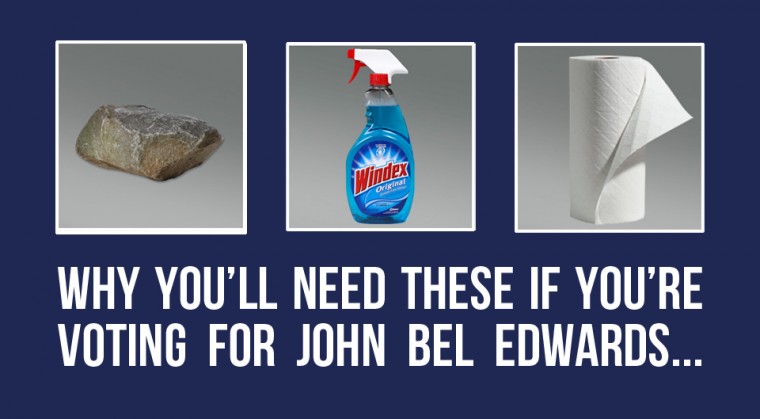
Can we talk for a minute? It’s about this governor’s race. Now, please understand, I’m the first one in line to expect a higher standard from myself, as well as from those whom we cast our ballots to lead our cities, represent us in Baton Rouge, and make our nation’s laws in Washington. But having high standards, and electing less-than-perfect public servants are not mutually exclusive, either.
It’s entertaining for some to judge, and even ridicule, David Vitter for being…well…a sinner, or having otherwise made a mistake, or a regret that he wishes he could have gone back and had a second chance to do all over again. But that hardly makes him any different than any of us. He did not blame others, or his circumstances, as so many others in our culture are prone to do today. He didn’t allege there was some conspiracy against him. He said, “I am completely responsible. And I am so very, very sorry.” He also said he had “asked for and received forgiveness” from God and his wife in confession.
Now, for Catholics (and Vitter is Catholic), confession is more than telling your sins to God on your way to work, or in the shower, and Him forgiving you. Confession for Catholics is a sacrament before a priest, instituted by Jesus Christ in his love and mercy, which permits all of us to reconcile with the church, and repent. Vitter did just that – and he did so many, many years ago, in fact.
But do we all need to be defined by where we came from, or should it be about where we’re going? Unless you allow it to, why does your future need to look like your past? Abraham Lincoln had failed in business and had a nervous breakdown before being elected President. Lucille Ball was dismissed from drama school with a note saying she was “wasting her time.” The Beatles were first told by a recording studio that their sound was awful and that “guitar music was on the way out.” Michael Jordan was cut from his high school basketball team. Thomas Edison was told by a teacher that he was “too stupid to learn anything”
The point is that if our past equaled the future, what chance – what hope – would any of us have to better ourselves, redeem our lives, or enrich those around us? Those who have reservations about voting for Vitter, not because of his politics, but because of his past, may need to be reminded that no man or woman is without a defect, or burden, or is wise enough to sidestep the effects of mistakes and bad decisions that we’ve all made in the past. A more accurate indicator of someone’s future, however, is the present moment, and what they are doing right now.
Still, there is a reader out there who says, “Well, if Vitter did that 15 years ago, he’s probably going to do that again, and embarrass us because the best predictor of future behavior is past behavior.” While that is relatively true, it turns out that such conventional wisdom about the “past being prologue” is a gross oversimplification, according to psychologists who study this subject.
For example, if you smoke a pack of cigarettes everyday for a year, your past is a pretty good indicator of your cigarette smoking tendencies for the near future. Same for exercise habits or drinking alcohol. That makes sense to me.
However, over longer periods of time, it turns out that these kinds of high frequency, habitual behaviors can actually be changed forever. For example, someone stops smoking at age 55, even though they have smoked everyday since they were a teenager. Or a heavy drinker chooses his family, over the bottle, spends the rest of his or her life sober.
People can change. You know that. And if not voting for David Vitter has virtually nothing to do with his politics, and everything to do with his imperfection, despite him remaining “clean and sober” and solidly representing our conservative values over the past 15 years, then here’s your stone, some Windex, and some paper towels – for that glass house you’ve built.
No, I’m not making you the issue, or the bad guy. It’s just sometimes we seem to be more and more critical of others and want to correct their imperfections, yet we are slow to mend our own (no, I’m not going to point out yours, or mine, right now). We judge others, too often without mercy, and yet pardon ourselves, too often without question. This is one of the reasons that reality television shows are so popular: It often makes us feel better about ourselves, as we watch and think to ourselves, “At least that’s not me.”
And maybe that’s what’s going on here. Maybe many of us are looking at David Vitter and saying, “At least that’s not me, and I’m going with the other guy, instead.”
Well, I just hope on judgment day, God doesn’t say the same thing to me.
